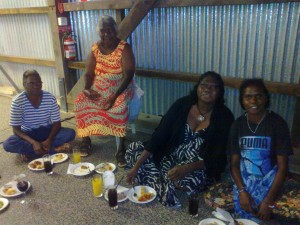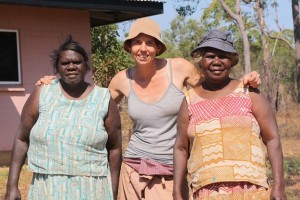I’ve been lucky enough since moving to the Northern Territory to find myself doing therapeutic work in collaboration with Aboriginal people. I mean real collaboration not consultation. To me, collaboration is a genuine partnership where both parties have an active role in achieving a shared outcome with mutual respect for the skills and knowledge of the other. In practical terms, this has meant being able to employ Aboriginal women to be in the counselling room with me. My Aboriginal colleagues haven’t necessarily had formal education or training, but to me the most important thing is a passion for helping women and children.
The advantages of providing therapy together are too numerous to mention. You can communicate with your client in their own traditional language; you can find out what the client’s body language means because they will always pick up things you don’t; you have immediate access to first hand information about community issues that could be impacting on a client; and you can explore traditional methods of healing that can be incorporated into the work. The other part of the ’two way’ learning equation, is the opportunity to impart knowledge and skills about mainstream counselling and group work methodologies, practices and even theories. In my experience, Aboriginal women are keen to learn and take an active role in the health and wellbeing of their own families and communities. Often they will be there working, way after you have packed up and gone, into the night seven days a week. So why shouldn’t they take up position alongside me in the counselling room? Unfortunately for the majority of Counsellors working in Aboriginal communities, this situation is the exception rather than the rule! But to me this is what anti oppressive social work practice looks like; I am being held accountable at every step on the journey. It’s definitely not easy work by any means, but any perceived obstacles to this practice can always be worked through. Yes things go at a lot slower pace. And what appears to be risky or outside the box, may actually result in some amazing transformative outcomes for everyone involved.

Patricia (right) at the Cairns SNAICC conference with the remote Therapeutic Team (Michelle and Elaine) and colleague (Therese)
One of my most memorable moments would have to be working with Patricia Munkara, who by complete accident happened to fall into the job (but that’s another story!) Patricia came with no experience at all but with an enormous amount of respect in the community with Elders and children and everyone in between despite her ‘young’ age. She also understood the importance of confidentiality for people that would come to us for support and was able to work with these challenges whilst fulfilling her family, community and cultural responsibilities. I saw Patricia develop from a shy, softly spoken woman into an outspoken advocate for children in her community! She even stood up and presented alongside me at a conference after just nine months into the job. Awesome!
It was an obvious choice for me to adopt this same model when starting my own business earlier this year. Many people are saying our service offers something unique in the Northern Territory. Tonight I launched our first crowd funding campaign, aimed at assisting my colleague Christine Burarrwanga to participate in ASIST (suicide intervention) training. This is another step towards our goal of offering a real collaborative culturally safe counselling and support service!
So check it out. Our small video will give you some more insight into what is important to us in our work.


